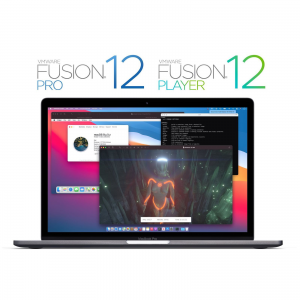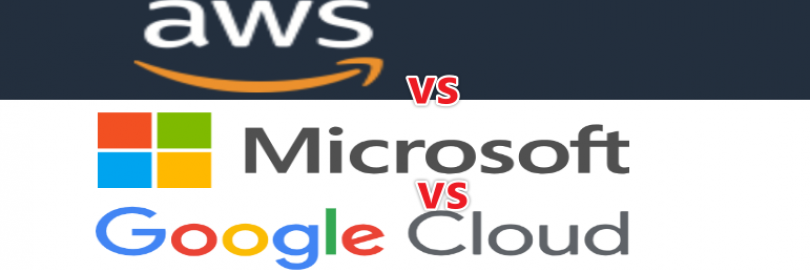
AWS vs. Azure vs. Google Cloud Certification: Full Comparison & Verdict 2024
AWS vs. Azure vs. Google Cloud Certification
| AWS | Azure | ||
| Age | Since 2006 | Since 2010 | Since 2008 |
| Price | From $100 | From $99 | From $99 |
| Market Share | 32% | 22% | 11% |
Certification Levels | 1. Foundation | 1. Fundamental | 1. Foundational |
| 2. Associate | 2. Intermediate | 2. Associate | |
| 3. Professional | 3. Advanced | 3. Professional | |
| 4. Specialty | |||
| How to Take Exams? | Online or go examination centre | Online or go examination centre | Online or go examination centre |
| Certification Update | Every three years | Every one years | Every two years |
| Languages | All three vendors offer all of their exams in English. Google also offers about half of theirs in Japanese and one of them in Spanish. But Microsoft and Amazon have much broader language support adding Korean, Chinese, Indonesian, German, French, Italian, and Portuguese. And Microsoft even adds two more: Russian and Arabic. | ||
About AWS Certification
AWS has enjoyed the largest share of the IaaS market since its rollout in 2006. Today AWS maintains roughly a 33% share, with Microsoft Azure at 16%, and Google Cloud at 8%. So, in terms of pure numbers and demand, AWS certification will likely yield the best returns for professionals. In terms of the scope of services, AWS stands at the top with over 175 services such as Developer tools, Database management, Analytics, Storage, Compute, Networking, Internet of Things, Security, Management, and, Enterprise applications.
This makes AWS a strong option for companies that are looking for a “one-stop-shop” solution. It has a huge community of customers and partners which include enterprises, startups, and government agencies.
Pros & Cons
| Pros | Cons |
|
|
|
|
| |
|
AWS Certifications
AWS offers a variety of certifications to help you validate your AWS Cloud skills and enhance your credibility. AWS certifications show that you have a conceptual knowledge of the platform and hands-on experience with the AWS infrastructure.
AWS Certifications are in high demand, often reflecting positively on job prospects
AWS offers a wealth of learning resources, making it a great starting point for those new to cloud technologies
About Microsoft Azure
Azure is the second-largest Cloud Service Provider, offering excellent support for interoperability with data centers, especially when integrated with Microsoft’s software suite. This makes Azure’s hybrid cloud solutions a standout feature. The integration of other services that customers may be familiar with – such as Office 365 and Teams – is also enticing for businesses.
It is the closest competitor of AWS. The platform offers a broad range of products and cloud services to enable businesses to address today’s challenges and create the future. Azure’s product portfolio includes compute, AI & Machine Learning, analytics, databases, DevOps, IoT, networking, storage, web, and security. Azure’s customers include enterprises, governments, and startups.
Pros & Cons
| Pros | Cons |
|
|
|
|
|
Microsoft Azure Certifications
Microsoft certifications provide globally recognized validation of mastering skills in digital and cloud businesses. They are categorized into a role-based structure which includes Fundamental, Associate, and Expert Levels.
Familiarity with Microsoft’s ecosystem makes transitioning to Azure easier, especially if you hold Microsoft Certifications like MCSA: Windows Server 2016, MCSA: Office 365, MCSA: Windows 10
Azure’s strong support for hybrid solutions can be a valuable skill as more businesses adopt a hybrid cloud strategy.
About Google Cloud
Google Cloud has a smaller selection of services but is more focused on machine learning via its powerful Tensor Flow platform. With machine learning being a huge focus of many modern businesses, this is a valuable option for futureproofing your skills and employability.
The company has also embraced open-source, and this expertise shows in the use of containers in particular. Many leading companies across industries rely on Google Cloud to solve their business challenges. Some of its popular cloud services include computing, data analytics, data storage, networking, IoT, and machine learning.
Pros & Cons
| Pros | Cons |
|
|
|
|
| |
|
Google Cloud Platform Certifications
Google Cloud certifications validate your knowledge and skills to transform businesses with Google Cloud technology. GCP certifications are categorized into Foundational, Associate, and Professional levels.
Saving Tip: If you like online shopping, don't forget to sign up at Extrabux!(What is Extrabux) , then you can enjoy up to 30+% cashback on your purchase from Extrabux! Sign-Up Bonus: Free to join it & get $20 welcome bonus! Student Benefits:As long as you are a student at school, you can get a free whole year long VIP Card worth $199.
Extrabux.com cooperates with many merchants, such as: Walmart (Up to 4% cashback), Sephora(4% -5% cash back), Moosejaw (5% -6% cash back), LOOKFANTASTIC (Up to 10% cash back), Sam's Club (Up to 15% cashback), Norton(Up to 20% cashback), Microsoft (Up to 7% cash back) and so on. You can save on buying daily necessities, fashion, beauty, electronic products, broadband installation, mobile communication, air tickets, hotels and other aspects of life!
AWS vs Microsoft Azure vs Google Cloud Certification
Market Share
The cloud market is dominated by three major players. Amazon ‘rains’ supreme with Amazon Web Services (AWS), followed by Microsoft with Azure and then finally Google with Google Cloud Platform (GCP).

Global Infrastructure
AWS
AWS are the global leader in this regard, with a large and powerful global network that is growing constantly. Here is a breakdown of the AWS global infrastructure:
26 Global Regions (with 8 more announced), consisting of 84 Availability Zones
17 Local Zones, with 28 Wavelength Zones (smaller data centers for ultra low latency applications)
108 Direct Connect locations (connect directly into AWS Regions)
Microsoft Azure
Azure’s global infrastructure is slightly different – there are Geographies, containing Regions, containing Availability Zones. Azure is a large contender, with a slightly different way of working.
60 Regions, combining to multiple Azure Geographies
Multiple Availability Zones
Hundreds of Secure Data Centers
Many Azure Edge Zones (small-footprint extensions of Azure placed in population centers)
Google Cloud
Google Cloud platform is also rapidly expanding its global presence, with new Regions being launched in Italy, Germany and Texas – just to name a few.
33 Regions
100 Zones
146 Edge Locations, all serving 200 plus locations and territories
Certification Levels
AWS
AWS certification, validate technical skills and cloud expertise to grow your career and business. AWS certifications classified into four levels: Foundational, Associate, Professional, and specialty certifications.
Foundational - Knowledge-based certification for foundational understanding of AWS Cloud.
Associate - Role-based certifications that showcase your knowledge and skills on AWS and build your credibility as an AWS Cloud professional.
Professional - Role-based certifications that validate advanced skills and knowledge required to design secure, optimized, and modernized applications and to automate processes on AWS.
Dive deeper and position yourself as a trusted advisor to your stakeholders and/or customers in these strategic areas.
Amazon Web services currently offer 12 certifications:
Foundational | Cloud Practitioner | No prior experience needed. |
Associate | Solutions Architect | Prior cloud and/or strong on-premises IT experience recommended. |
| Developer | ||
| SysOps Administrator | ||
Professional | DevOps Engineer | 2 years of prior AWS Cloud experience recommended. |
| Solutions Architect | ||
Specialty | Advanced Networking | Refer to the exam guides on the exam pages for recommended experience. |
| Data Analytics | ||
| Database | ||
| Machine Learning | ||
| Security | ||
| SAP on AWS |
You can take any exam you like in any order, and it is recommended that you start of with the AWS Cloud Practitioner, to build a good basis of knowledge. From there you can go down any path and get as many or as few certifications as you like. There are many resources provided by AWS directly to help you prepare for your exam.
The AWS SysOps Administrator exam is considered the hardest among the AWS Associate level certifications. The AWS Certified Solution Architect Professional certification has the reputation of being the most challenging of them all – with employers willing to pay a premium for candidates who have this certification.
Research shows that those obtaining the Solutions Architect Professional certification currently earn between $136,500 to $198,500 – demonstrating the value of this certification.
Microsoft Azure
Azure certifications are essential while seeking a career in the cloud computing industry. Microsoft now has 13 Azure certifications classified into three levels: Fundamental, Associate, and Expert. These exams are to validate your expertise in the Azure cloud. And purely focus on developing knowledge and skills related to current market job roles.
Fundamentals Certification – Fundamentals Certification is for beginners who have started their journey into learning cloud concepts. Also, people with non-technical backgrounds can start their journey in the cloud with these certifications.
Associate Certification – If you are already familiar with Azure, you are good to go to get these certifications listed in your resume.
Expert Certification – With prior experience, deep understanding, and associate-level knowledge in Azure, you can get an expert certification.

It is estimated that the average salary for a Microsoft Certified Azure Solutions Architect Expert is around $135,000 – showing that this certification is definitely worth getting.
Google Cloud
Google Cloud certifications validate your expertise and showcase your ability to transform businesses with Google Cloud technology. Google Cloud certifications classified into four levels: Foundational, Associate, and Professional.
Foundational - Recommended experience: No hands-on experience with Google Cloud is required.
Associate - Recommended experience: 6+ months building on Google Cloud.
Professional - Recommended experience: 3+ years industry experience, including 1+ years on Google Cloud.
| Foundational | 1. Cloud Digital Leader |
| Associate | 1. Cloud Engineer |
Professional | 1. Cloud Architect |
2. Cloud DevOps Engineer | |
3. Cloud Developer | |
4. Cloud Security Engineer | |
5. Machine Learning Engineer | |
6. Data Engineer | |
7. Cloud Network | |
8. Collaboration Engineer |
Exam Duration
AWS
When you sit for a AWS fundamentals exam, you get 90 minutes for their Foundational exam, just over 2 hours for their Associate exams without labs and 3 hours for any expert-level exam or associate one that does have a lab.
Microsoft Azure
Microsoft Azure Fundamentals exam gives you just 45 minutes because it's a short exam with no labs, while other Microsoft exams give you either a 100 minutes or 120 minutes, depending on whether they include labs.
Google Cloud
Google also lets you have 90 minutes for their entry-level exam, and then two hours for all the rest.

Exam Prices
AWS
AWS Foundational exams are $100 US, Associate ones are $150 and all the rest are $300.
Microsoft Azure
For Azure exams, Microsoft also charges $99 for the Fundamentals and then, $165 all of the rest.
Google Cloud
Google charges $99 at the entry-level, $125 at the Associate, and 200 for the Professionals.
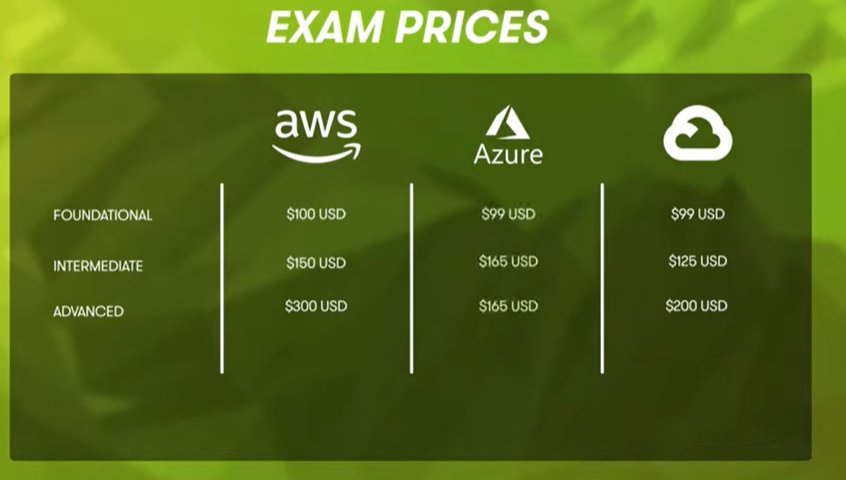
Retake Policies
All three platforms offer retake policies.
AWS
You can retake the exam after two weeks.
Microsoft Azure
Microsoft is quite similar with two-week delays between attempts — except that they'll let you retry the first time after just one day. Then, they'll limit you to a maximum of five exam attempts in any 12-month period.
Google Cloud
Google Cloud makes you wait 14 days after a first fail, 60 days after a second fail, and making you wait an entire 365 days after a third failed attempt.
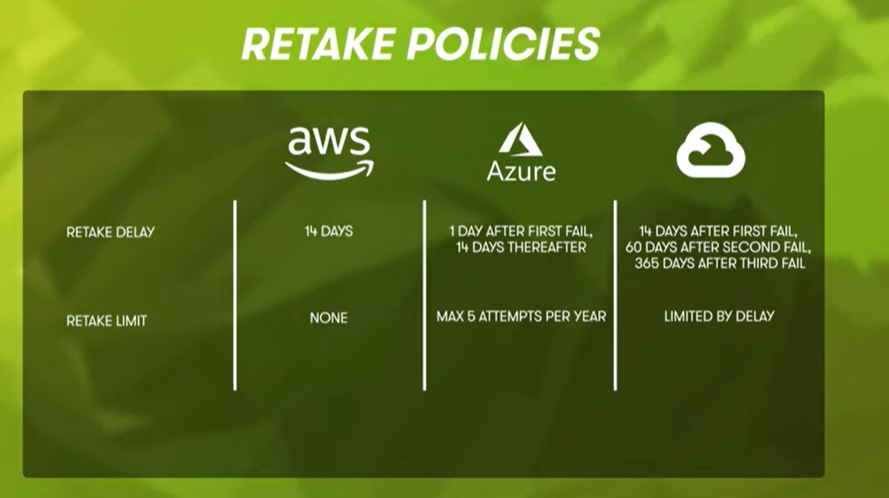
Languages
All three vendors offer all of their exams in English. Details as follows:

Verdict
Each platform has its strength, including its load balancing, computer engineering, and number of data centers. AWS, Azure, and Google Cloud are well-respected for a reason; they all have benefits and make excellent cloud service providers.
If the majority of companies in your area (or where you’re wanting to work) run on AWS, then an AWS certification could be the best fit for you.
However, if you want to specialise in Azure or Google Cloud, there are likely to be programmes for that as well. You can shape your career in cloud computing however you like.
If you’re fresh out of college or a newbie with no background whatsoever in cloud computing, we recommend learning AWS. Amazon Web Services has an uncomplicated user interface, making it appealing for beginners. You’ll also have a more satisfactory experience studying AWS. You can find many great online tutorials on using its services because AWS is the widely used cloud platform. You’d quickly discover online AWS communities and groups that could answer your questions when facing problems that you don’t understand while doing hands-on practices.
①If you are looking for an entry-level position in a cloud-based job, you’d have a more reasonable chance if you choose to learn AWS as more job offerings pursue expertise in AWS.
②If you are interested in big data and Machine learning in the cloud, consider looking into the Google Cloud Platform. If you’re applying for a company that primarily uses Microsoft Services, you’ll have to learn Azure.
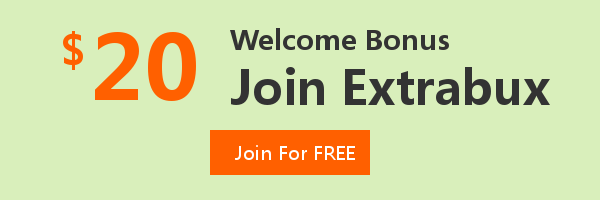
Extrabux is an international cashback shopping site, offering up to 30% cashback from 10,000+ Stores!
Microsoft, Dell, HP, Lenovo, Alienware, Acer, Asus, Samsung, BestBuy, Walmart, Staples, Overstock, QVC, New Egg, Office Depot, eBay, etc.
Join to get $20 welcome bonus now! (How does Welcome Bonus work?)
Recommendation
-

10 Best & Stylish Winter Coats for Women on NET-A-PORTER in 2024
-

Top & Best 12 Sneaker Apps/Websites for Raffles, Releases & Restocks in 2024
-
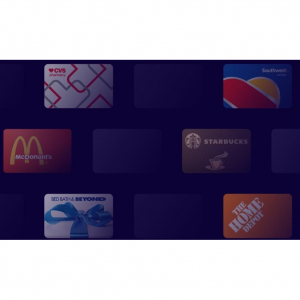
7 Best Gift Card Exchange Sites - Buy, Sell and Trade Discount Gift Card Safely and Instanly!
-

Top 9 Professional Skincare Brands for Licensed Estheticians 2024
-

13 Best Luxury Online Shopping Sites with Highest Cashback in 2024 (Coupon Code+Sale+14% Cashback)
Up to 14% Cashback!


